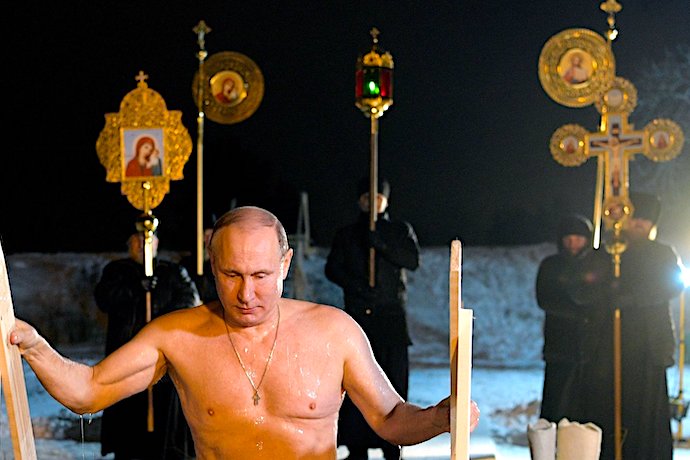Vladimir Putin’s campaign of violence in Ukraine has brought to the fore questions about his longstanding religious connections, prompting scholars and journalists to challenge his well-marketed piety and seemingly deep devotion to Russian Orthodox spirituality—the latter of which is often expressed in its deep ties to the post-Soviet Moscow Patriarchate. In the study of religion, it’s long been common to question whether the categories of sincere or authentic religious belief are adequate for analyzing the complex motivations and actions of adherents or believers.
When practitioners are public figures with global geopolitical aims, the classification of true religious subjectivity is often suspended in favor of assuming a kind of charlatanism, or spiritually spurious intentions built to curry favor with faith communities. Our goal here isn’t to argue about Putin’s personal faith; rather, we want to reflect on how academic assumptions about individual religious practices and beliefs are often analyzed through categories that typically begin and end with western conceptions of what counts as correct or wholehearted spirituality. In other words, we want to question the questioning of Putin’s faith.
Whether it’s religious leaders in the US calling elected officials to account for assumed incongruities between their professed religious convictions and their legislative priorities (e.g. “if Donald Trump is Christian, how can he favor locking children in cages?”), or disagreements as to whether Christian nationalist rhetoric is “really about” gender or sexuality or race, the notion that a given political actor’s religious sincerity is both discernible and relevant is hard to shake.
Presumably this is tied in with confidence that authentic or pure faith can somehow serve as a check upon nakedly political ambitions, even as scholars also caution us that treating a given religion as a sui generis phenomenon uncontaminated by political conditions is also often a form of mystification rather than clarification. Religious expression, in other words, is deeply contingent on political, cultural and material—i.e. ‘worldly’—conditions.
In the case of the current conflict between Russia and Ukraine, some writers have suggested that Putin’s latest attempt to ravage Ukraine is a holy war, and that the Russian president understands his imperialist role in global politics as almost divinely inspired or mandated. Somewhat paradoxically, however, when Putin’s individual beliefs are positioned in this public framing, he’s often pegged as religiously motivated but not a true believer; he’s seen as evil or a fraud. These incongruities harken back to how Donald Trump was assessed by scholars and the media over the last decade, and typically those writing about both politicians have not fully interrogated the psycho-social dimensions of their religiosity.
We have, it seems, become used to believing that those most adamant about the holiness of nationalist causes are, cynically, the least purely religious themselves. Perhaps this is the case with Trump, but if we opt for the bad faith actor frame immediately, as many do with Putin, we lose sight of potential contributing factors that personal faith makes to his political actions. If we don’t take seriously how religion personally relates to or contours Putin’s worldbuilding agenda, then we miss out on the historical and theological backing he uses to bolster his claims of political authority.
The case of Vladimir Putin’s relationship to post-Soviet Russian Orthodoxy illustrates both the temptation to gauge his religious actions in these terms of sincerity and authenticity—“is Putin really a believer or is he just using religious rhetoric to shore up the Church’s support of his ambitions?”—and the limits of doing so. Needless to say, no one has access to another’s inner life, and in the case of Putin he’s famously opaque as to his real driving motivations and beliefs.
Yet Putin’s supporters suggest that his public actions of piety—including shirtless dives into the blessed frigid waters during Theophany, his pilgrimages to sites such as Mt. Athos, and his purported regular confessions to a spiritual father—are indicative of a personal piety that makes him a proper political and spiritual heir to many of the Russian tsars. Through these acts of performative piety, Putin links himself theologically and politically with the power of Russian Orthodox history and its unique relationship to state, often monarchic, authority. Within sectors of the Russian church and its Western admirers, monarchs are often regarded as saints and as cosmic protectors of Christendom and its proper relationship to political authority.
Certainly, Putin’s war in Ukraine, with its indiscriminate bombing of civilian homes, hospitals, and places of worship, leads western media to speculate about how someone who actively markets himself as a Christian could approve such a catastrophic campaign. Apart from the problematic assumption that if one is authentically religious they must be good, we in turn might ask what Putin’s long history of supporting anti-human rights policies in Russia means in terms of sincere religiosity. After all, we tend to acknowledge the deep religious beliefs of American public figures, like former Vice President Mike Pence, who often support many of the same anti-human rights ideas as Putin.
Given the clash between Putin’s performative piety and prejudicial policies, it’s natural for those troubled by his actions (including the invasion of Ukraine) to contest narratives of his personal holiness in favor of a more skeptical narrative that renders his religiosity as simply a cynical ploy to dupe a longsuffering church that underwent genuine trauma under Soviet repression. Yet to do so is essentialist. It makes assumptions about personal religiosity that are unknowable, sometimes even to the believer themselves. Furthermore, using a western (passively Protestant) conceptual framework for understanding Orthodox religiosity reenergizes longstanding orientalist assumptions about the political sophistication of Christianity outside of the West.
The Western imagination is shaped by suspicion of Elmer Gantry-like appeals to religious sentiment for political gain. This, of course, takes place against the further backdrop of a largely Protestant tendency, however secularized, to measure the intensity or truthfulness of religiosity according to the sincerity of the believer. This skepticism joins a long tradition of political critique regarding religious belief and practice.
This line of critique is called into question, however, when we consider that, in the last several decades, and especially since perestroika, the Russian Orthodox Church (ROC) has crafted a particularly enmeshed mix of politics, religion, imperial nostalgia, and lethal military force under the auspices of a revival of “Holy Rus,” and more disturbingly a multinational “Russian World.”
The Russian Orthodox Church, in many of its expressions, has been an active participant in Putin’s vision of global domination. Patriarch Kirill isn’t just a willing participant in the transnational expansion of Russian power, culture, and Christianity—he’s a co-conspirator in this worldbuilding project of faith and politics.
But the matter goes beyond the hierarchy proper. From priests actively blessing and supporting the development of a nuclear arsenal; to the invocation of the beloved St. Seraphim of Sarov in favor of a military deterrent “shield” around Russia’s territorial interests; to the more recent willingness on the part of the Moscow Patriarchate to cast the invasion of Ukraine in terms of a holy war against the corrupting powers of Godless Western secularism; the Russian Church has been an active participant in the construction of an apocalyptic mythos. Within this project of weaponized faith, the lines between the “religious” and the “political” are nearly impossible to discern, because in fact the categories themselves are so intertwined as to be inseparable.
The co-mingling of faith and politics, for better or worse, is part of the history of Orthodox Christianity. Byzantine Symphonia. Nationalism. Monarchy. In some respects, it’s a marriage of incongruences that has been lived out in unions of political conveniences, religious freedom, social oppression, and spiritual marginalization. We can’t understand Putin’s contemporary preoccupation with power without understanding how Russian Orthodoxy and political authority have historically developed in tension with each other—during the pre-revolutionary period, against the backdrop of the Soviet Union, and in the post-Soviet moment.
We also can’t understand this current crisis without understanding how Putin’s nationalist worldview has been shaped by Orthodoxy, a faith that has wrestled with nationalism for centuries. Putin and the Russian Orthodox Church are entangled in a theopolitical relationship of reliance and reconfiguration. To assume that either is insincere in their religious goals is to misunderstand the imperial worldbuilding project of Russian Orthodoxy more generally.
While Western commentators on the ROC should resist the temptation to exoticize it by overstating the distinctions between it and more familiar modes of Christian nationalism in the United States and Europe, the truth is that any sharp distinctions between authentic or pure faith on the one hand and cynical political manipulation on the other (or, as a corollary, between sincere religious conviction as opposed to pragmatic appropriation for political ends) betray a kind of characteristically Western Protestant prioritization of belief over action, of conviction over ritual, of pure Church over political entanglement. In the case of Russia and its ecclesial/political hierarchies, those dichotomies obscure more than they illuminate.
What’s interesting about the Russian Church and its active complicity with Putin’s agenda in Ukraine is that, in a manner perhaps akin to emerging and strengthening forms of white Christian nationalism in the United States and Europe, in order to understand what’s happening we need to get past any implied purity of religious expression, or the categories we use to describe it, in order to understand just how deeply entangled religious belief, politics, and empire are in global geopolitics.
We cannot know, finally, whether Putin is a real or sincere Christian believer, partly because categories for analyzing belief founder in the face of the complex post-Soviet Russian Orthodox experience. And while we may not be used to questions of what it means to “believe” ceasing to be academic and becoming matters of life and death, those days may be upon us.





